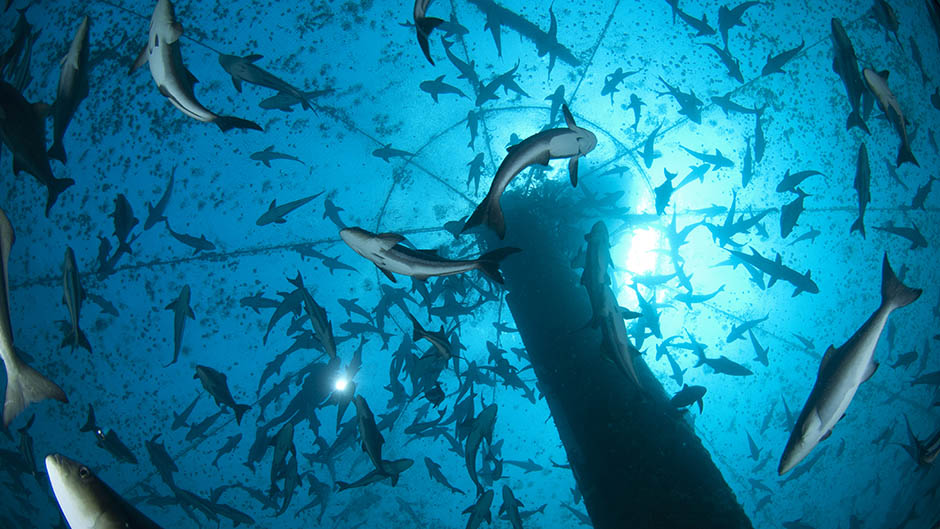Miami Herbert alumnus invests in sustainable open ocean aquaculture
Cibeles Duran, 04-18-2022

Since 2009, Miami Herbert alumnus Gabriel Diaz has been helping to pioneer ocean fish farming in his native Panama. His company, Open Blue Sea Farms, Inc., cultivates cobia, a tropical whitefish, in its natural Caribbean habitat through facilities seven miles off the coast of Costa Arriba. With 22 pens and 1,200 tons of fish harvested annually, the company operates the world’s largest open-ocean farm.
Diaz considers the venture an investment in helping to maintain integral ocean life while producing food through sustainable practices.
“We do this work with a purpose to do good for the world and society,” he says. “We want people to have food for the next generations through cleaner, best practices.”
According to InnovaSea, a designer of aquatic solutions, Open Blue’s copper alloy mesh enclosures pose a minimal impact on the environment and enable the flow of natural water currents.
“Our fish don’t breathe the same water twice,” Diaz points out.
The natural habitat allows Open Blue to supply the market with fish that have been raised in their natural habitat. In essence, they are “raised in the wild.” Benefits extend to the sustainability but also a clean buttery taste that is second to none. The farming location several miles into the sea signifies no competitive threat to the independent fishermen who make a living from their catch closer to land. Moreover, ocean farming removes the negative effects of other forms of fishing such as trawling, in which nets indiscriminately scoop up marine life beyond the target species and often cause damage to reefs and other elements of the ocean’s ecosystem.
“Responsible agriculture represents the best way to feed the world,” he says. “We are showing that one can invest and make a profit while being respectful of the environment and the community.”
Diaz initiated his career after graduating from Southern Methodist University in Dallas with his undergraduate degree. Upon returning to Panama, he first entered banking and later joined the wealth management business. In 2012, he co-founded his own financial services company and began investing in initiatives for ocean preservation, including taking an ownership stake in Pristine Oceans S.A., a startup with the goal of launching an offshore fish farm. Meanwhile, leadership at Open Blue, an ocean farming startup in Puerto Rico at the time, had been considering Panama as an ideal location. A merger seemed natural, and the two companies came together in 2009.
“They had the experience and we had the installations and the fish in the water,” Diaz explains. “It was a simple merger and it made sense.”
The following year, Diaz enrolled in Miami Herbert’s dual MSPM/MBA program, attaining a Master of Science in Professional Management in 2011 and an MBA in 2012. The program, designed for executives and professionals in Latin America, allowed him the flexibility to attend school without needing to relocate. He attended classes on campus in two-week intervals every two months and a half, enabling him to return to his work and home in Panama and maintain his schedule as a business owner.
“In this program, I always kept working. I always had fresh information to apply to my day-to-day business,” he says.
He recalls presenting Open Blue as the subject of his final project for his MBA Global Entrepreneurship class, taught by Professor of Professional Practice Joseph Ganitsky. The project gave him an opportunity to envision the next phase of the company by preparing financial and marketing plans. He also highlights the value of faculty and speakers with real-life experiences in the field.
“It was much more than just reading a textbook,” he says. “Listening to other people’s examples and experiences from their businesses helped me understand that we need to work in an integrated way with the community and with our employees.”
The ocean conservationist calls Open Blue “the most important project that I have been involved in from a sustainability standpoint.” Today, the company continues to grow as a leader in the industry, serving as the largest supplier of cobia to the United States. Heavy emphasis on research and development—Open Blue has a long-standing relationship with Dr. Daniel Benetti and his aquaculture group at the Rosenstiel School of Marine and Atmospheric Science at UM—allows for continued innovation in areas such as optimized feeds for the fish, sustainable packaging, and new products like the recently launched cobia burger.
For Diaz, efforts come down to raising “a healthy fish in a responsible, sustainable way.” Among the principles that he lives by, “don’t only focus on whether you make money or not,” he advises. “You have to feel a connection to the business beyond the bottom line and you want that connection to consist of knowing that you are doing something that is meaningful.”
Diaz also cites work-life balance as a critical element of true success. Among quality time with his wife and children, 4 and 1, and a third on the way, he enjoys getaways to the beach, where he can again be in contact with his passion for the ocean.